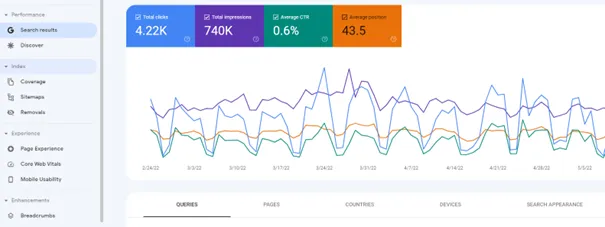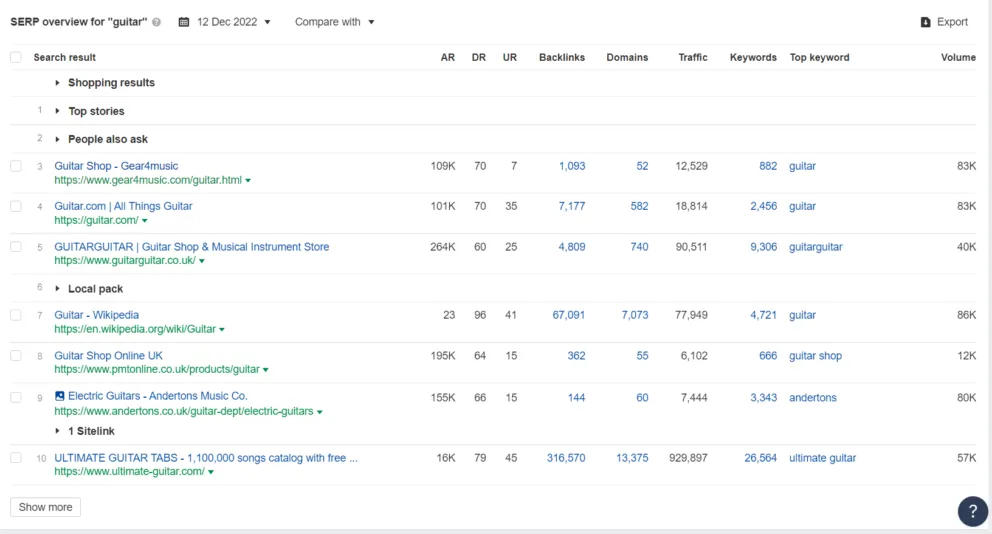Whether you’re completely new to the world of Search Engine Optimisation (SEO) or are an experienced SEO specialist, keyword research is an essential step to take.
Selecting the ‘right’ keywords will help you perform well in organic search results, and a big part of finding these keywords is considering their search volume.
So, what keyword search volume should you be aiming for? We have the answers.
What is Keyword Search Volume in SEO?
If you’re new to SEO you may be wondering, what exactly is keyword search volume?
Keyword search volume, which can be defined as the number of times a keyword is searched for within a specified time frame, plays a key role when researching relevant keywords to target. In short, this number demonstrates user demand and can be used to roughly approximate how competitive a keyword is to rank for.
In relation to search volume, a keyword is considered to be the exact match of a term as opposed to its numerous semantic variants. Let’s take our meta length checker for example. The phrases “meta length checker tool” or “tool to check meta length” would be considered variants of the keyword “meta length checker”, and so could return a different keyword search volume.
It’s important to distinguish that we are discussing keywords in relation to SEO here, not PPC.
So, what is a good keyword search volume? Read on to find out.

What is a ‘Good’ Keyword Search Volume?
If you twisted our arm for a definitive answer, a good keyword search volume is 100 – 1000 searches a month, as this would likely provide good levels of organic traffic. However, a ‘good’ keyword volume depends on a variety of factors, including search intent, industry, seasonality, and competition to name a few.
Context is vital. For example, a large, well-established company may consider 500 searches per month to be a low search volume, whereas a smaller, more niche company may consider this to be a high volume. A ‘good’ keyword search volume will also vary dependent on location, too. What is considered a high or low search volume in the US, for example, will vary considerably compared to the UK.
| Niche | Low | Average | Large | Broad |
|---|---|---|---|---|
| 0 – 30 | 30 – 100 | 100 – 1000 | 1000 – 10,000 | 10,000 + |
| Consider if you’re targeting a very niche offering, a long-tail question, or a search with numerous close variants. | Good volume for niche offerings, localised searches or specific product searches. | Safe volume for a wide range of applications, such as most common products, product categories, services or article topics. | Keywords in this range will be either extremely competitive and/or be broad topics with multiple subtopics. | For high authority bodies such as GOV.UK or corporate giants such as Facebook. |
How to Measure Keyword Search Volume
Keyword Research Tools
It’s important to understand how your SEO tools will impact your keyword research. Whilst these tools are incredibly useful when researching keywords and analysing online ranking data, niche searches can be undetectable at times. It should be noted that tools cannot consider every search variation possible and that each tool reports on search volume slightly differently.
Google Ads Search Terms Report
Okay, this may not be every SEO practitioner’s idea of a keyword research tool, but bear with us. Google Ads Search Terms Report pulls live data from your currently running paid ads, and shows you what search terms are showing for a specific ad. An impression is counted each time your ad is shown on a search result page or another site within the Google Network for a particular keyword. Arguably, this is the accessible way to get an accurate figure against how many people are actually searching for a specific term that you’re targeting through paid search.
Whilst Google Ads Search Terms Report may provide more accurate insight than a database search tool like ahrefs, you must have ads live or have had ads live to be able to access this data. The data you’ll get will be for the ads you are running/have run, not just any terms you want.
Google Ads Keyword Planner
The keyword planner available within Google Ads provides estimated keyword volumes, ideal for keyword ideation for SEO. Whilst it doesn’t use live data, as this tool is connected directly to Google, it is more likely to provide reliable, representative figures.
Not only does Keyword Planner provide useful insight, but it also allows you to assess the seasonality of a keyword.

Google Search Console’s (GSC) Search Results report is another valuable tool for keyword research. GSC’s Search Results report provides up-to-date search data for any given timeframe, collecting and providing representative data from Google search results based on your website and existing content.
This report allows you to look at top-performing keywords on a page-by-page basis, country basis and specific term basis. It displays search terms users have inputted to bring up your specified website, providing the number of impressions this led to, as well as clicks, CTR and average position in the SERPs.
This tool is ideal for research for keyword expansion and optimising existing content. It can also be used to identify niche search terms, which can often be a limitation of larger SEO tools.
For example, if you looked at a niche website’s total organic keywords in an SEO tool like ahrefs or SEMrush, it caps the total keyword volume at a minimum of 20 average searches a month. This means their core offering is not reflected in their keyword breakdown as it’s so niche. You open GSC’s Search Results report and find your anticipated keyword and its variants right at the top of the report, combined with high click through rates.
The downsides to GSC’s Search Results Report are that it only provides insight on the number of impressions your search results receive when they’re showing in Google. So, you’ll only get representative search volume data if you’re consistently holding a strong position in search. Another downside is that you only receive impression data if you’re already ranking, which is a huge limitation if you’re planning future content or want to analyse competitor keywords.
SEO tools
Common SEO tools, such as ahrefs and SEMrush, allow you to conduct keyword research in an extremely accessible way. With the ability to search for any keyword to find search volumes, as well as look at any website’s keyword data (including your competitors), these tools give you the freedom to explore almost all the keyword insight you need. Discover how your competitors’ content is performing from a keyword perspective and leverage ideas for your own site. They have the top spot for that question? Surely you can do better.
It’s important to remember that most, if not all, SEO tools do not pull live keyword data. Instead, these tools maintain vast databases of keywords whose search volumes they update periodically.
Let’s look at our meta length checker again. The table below illustrates the difference between Ahrefs’ estimated monthly search volume and Google Search Console’s monthly impressions.
| Top queries | Ahrefs (Monthly Search Volume) | Google Search Console (Monthly Impressions) | Difference |
| meta description length | 900 | 12147 | 11247 |
| meta description length checker | 400 | 2264 | 1864 |
| meta description checker | 250 | 3001 | 2751 |
| seo meta description length | 50 | 1295 | 1245 |
| meta description character limit | 100 | 2411 | 2311 |
| meta length checker | 60 | 598 | 538 |
*Keyword researched accessed on 05.01.23
Whilst these tools can be used as very useful indicators, they’re not exhaustive. So, not every keyword will be held in their databases, especially terms that are very low volume, particularly niche, especially long-tail or new to search (think trending hashtags). You should be aware that you may find discrepancies in the data due to its database model.
Understanding the opportunities and limitations provided by each tool alongside your intuition is sure to stand you in good stead when selecting your keywords.

Things to Consider When Selecting Keywords
Selecting relevant keywords to target is all about being realistic. Understanding both the nature of your business and your content will provide the key to assessing which keywords will help you climb the rankings.
Understanding Search Intent
Considering the searcher’s intent is vital and should be a priority for any search marketer. Understanding and delivering on the searcher’s intent will allow you to be specific with your keywords, helping you to rank well and improve conversions.
The different types of searches include:
- Informational: searcher wants information
- Navigational: searcher wants to locate something very specific, such as company contact details
- Transactional: searcher wishes to buy something specific
- Commercial investigation: searcher wants to compare and find the best product or service
- Local: searcher wants to find something near them
By meeting search intent, you can negate the worry about smaller search volumes, too. While there is still value to be had in targeting large search volume keywords, meeting specific search intent means you’re more likely to reach a relevant audience and satisfy their specific needs.
Be Specific
Although ranking for a hugely popular keyword may seem like an appealing challenge, this is a difficult task that may run the risk of attracting the wrong target audience to your page.
Let’s use an example. If your business sells guitars, ranking highly for the broad keyword ‘guitar’ is likely to be an impossible challenge with a search volume of 86k. Ranking for a specific make, model, and variant, such as the ‘fender player telecaster butterscotch blonde’ however, is a much more achievable task with a search volume of 150.
‘guitar’ search volume (Ahrefs, December 2022)

‘fender player telecaster butterscotch blonde’ search volume (Ahrefs, December 2022)

By narrowing down your keyword specificity, you not only increase your chances to rank well for that keyword, but you are able to better target your desired searcher. For example, a user searching the word ‘guitar’ may simply be looking for general information. This would be considered informational search. A user searching for an exact make and model, however, is far more likely to lead to a conversion than those broadly searching ‘guitars’. This could be considered a transactional search as the user has put in the exact product name – they know what they are looking for.
Industry
Take a moment to consider the industry that you’re in. Different sectors may yield different results, and it’s important to assess how this may affect your research before you select your keywords.
A large industry with a prominent online presence and a high number of competitors, such as IT, will naturally return higher search volumes, proving ranking to be more difficult.
‘it support services’ search volume (Ahrefs, December 2022)

A smaller industry, on the other hand, is likely to return lower search volumes as there is naturally less demand. Smaller, more local businesses can target those keywords with lower search volumes to achieve results. Remember, as we said earlier, if a keyword’s search volume is niche enough, it may not even be stored in SEO tools’ databases!
‘instrument repair service’ search volume (Ahrefs, December 2022)

For a small business, such as one offering an instrument repair service, a low search volume of 20 is to be expected. Don’t be deterred by a low search volume if that’s just the nature of your business, as this allows you to rank well for your specific keyword if there’s less competition.
Understanding what is considered a high or low search volume for your business is vital when choosing your keywords. What may look like a high search volume for a small business might be a drop in the ocean for a large corporation.
Seasonality
Another element to be aware of when choosing your keywords is seasonality. Consider whether your business’s products or services are evergreen or seasonal, and how this may impact your content. If your business peaks around the festive season or is busiest during the summer, then make sure to watch out for keywords increasing in demand at certain times of the year!
Remember to use your range of tools – Google Ads Search Terms Report, Google Ads Keyword Planner and Google Search Console all show the seasonality of keywords.
Competition
The last, but certainly not least, element to consider is competition. Whether it’s fighting for that position in the SERP, or beating your competitors to the chase, choosing keywords is all about competition. Competition can be split into two elements: your competitors and keyword competition.
How to Measure your Competition:
- Look at SERPs (Search Engine Results Page) to match intent
Considering your competitors will play a key role when deliberating which keywords to choose. Remember: your competitors are who you would be competing against in search results for a chosen keyword, not necessarily your business competitors.
The first step is to see how your competitors are ranking and to look at the SERPs for the keyword you wish to rank for. Using a tool such as ahrefs, simply search for your desired keyword and look at the SERP overview. Here you’ll find the top 10 search results, otherwise known as your competitors.

It’s important to recognise the web pages that are ranking well for that key term and consider how your webpage compares. A search engine’s algorithm will consider intent behind a search, serving the best results depending on said search. For instance, if you optimise for a product-based keyword, and the first 10 listings are eCommerce product pages and you have an informational page, then the likelihood of you ranking is next to none.
The next element to consider is how well your competitors’ content is meeting the intended keyword. Take a competitor’s blog post, for example. The searcher may be asking ‘what are the best holiday destinations in the UK?’, which your competitor is intending to answer. But do they answer it well? Look at their content, and if you think you could better optimise this piece, offer better content, and satisfy the keyword, this is the perfect opportunity to try and rank higher than your competition. This technique is otherwise known as ‘skyscraping’. SEO’.
2. SEO measures of websites in the SERPs
Once you have identified your competition, it’s time to look at the SEO measures of those ranking websites. ‘Domain Authority’ (DA) or ‘Domain Rating’ (DR) are common SEO tool metrics used to determine the strength of a website’s backline profile. Scored out of 100, this rating provides a good assessment of a site’s competitiveness. If the domain rating of your competitor is 70, but yours is only 20 for example, you may want to reconsider how realistic it is that you outrank them for that keyword.
Looking at other metrics, such as the number and quality of referring domains, and the number of organic keywords your competitors are ranking for is an easy yet highly-effective way to quickly gauge the level of competition when creating your keyword strategy.
3. CPC in PPC
Another handy way to measure your competition is to assess the cost-per-click (CPC) for your intended keyword. It’s simple: the more expensive the CPC is for the keyword, the more competitive it will likely be to rank for. Simply use a tool like Ahrefs or Google Ads Keyword Planner to look at this.
4. Keyword competition metrics in SEO tools
Once you have assessed your competitors, it’s time to assess the competition of the keywords themselves. Search volume itself, as we have implied throughout this blog post, can be an indicator of how competitive a keyword is to rank for. Informed by a variety of tools (and your common sense!) this metric is a great way to determine which keywords are realistic for you to rank for.
Keyword difficulty is another useful competition metric found in most SEO tools. This can act as another handy indicator of the competitive nature of a keyword, although remember this number is only indicative, so we advise you take it with a pinch of salt.
Striking a Balance
Keyword research is all about balance. Striking a balance may seem like a daunting and slightly ambiguous task, but understanding how different factors may influence your keyword ranking potential is vital. Assessing the nature of your industry, your competition and the specificity of your keywords will help you be practical about the keywords you can rank for, ensuring your success.

Should I Target Low Search Volume Keywords?
Yes – don’t be afraid of low-volume keywords.
As stated above, the more specific you are with your keywords, the more likely you can increase traffic to your page and encourage conversions.
Unless you’re an industry giant reading this, targeting keywords with a ‘low’ search volume is more likely to result in successful ranking than targeting keywords with a large search volume. Selecting your keywords is about being realistic about what you can achieve and making your impact where it matters.
If you fail to rank well, or even at all, by selecting overly-ambitious keywords, you lose the chance to steadily grow your presence in the SERPs. By selecting keywords that are realistic for you and securing your place in search results, you open the opportunity to grow the reach of your webpages.
Want to ensure that your content will perform and climb those rankings? Don’t hesitate to get in touch with the experts at MRS Digital. We balance competitiveness, likelihood to rank as well as keyword search volumes to create a keyword and content strategy that meets yours needs best.






